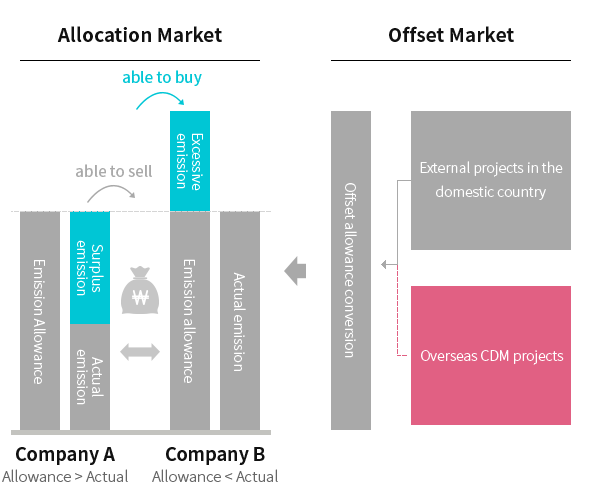

To support SMEs with a lack of carbon management capability in using carbon mechanisms, ASEIC runs a program for SMEs that entered the markets of developing countries to have Certified Emission Reduction (CER) credits they earn through fossil-to-biomass conversion linked with and transferred to emission allowances in their home country.
This Greenhouse Gas Reduction Project is based on the Clean Development Mechanism (CDM), one of the UN’s greenhouse gas reduction initiatives. The CDM serves two ends: developed countries can save cost for greenhouse gas reduction and developing countries can receive investments for eco-friendly technologies. In particular, ASEIC takes into account of small-sized operations (less than 60,000 tons) of SMEs and runs the program in a Programmatic CDM (PCDM) format by having an overarching Programme of Activities (PoA) to which Component Project Activities (CPAs) can be added continuously. As a Coordinating and Managing Entity (CME), ASEIC registers the ‘Biomass Fuel Conversion’ PoA, keeps recruiting SMEs to participate as a CPA, supports them environmentally and economically, and provides training to raise their greenhouse gas reduction monitoring capability. The ultimate goal of the program is to support eco-friendly conversion of SMEs by providing a platform on which gas emission allowances may become relevant to SMEs.

Programmatic CDM is a tool proposed by UN specifically for small-sized greenhouse gas reduction projects that were not operable in the existing CDM projects by registering them in the form of a programme. The tool is applicable to programs for SMEs that have relatively lower carbon emission. Once the greenhouse gas reduction programme (PoA) is developed, CPAs can be registered through a simplified procedure.

* PoA (Programme of Activities) : Comprehensive programme activities
* CPAs (Component Project Activities)
: Unit projects that satisfy PoA criteria
* After a programme is (PoA) registered, it is possible to add CPAs continuously (extension possible up 28 years)
☞ Time and expense for adding projects are reduced.
SMEs have been struggling to get themselves engaged in emission allowance projects due to lack of information and professional manpower regarding carbon credits. ASEIC supports participating SMEs with individual training and capability enhancement. ASEIC further plans to increase the access of SMEs to carbon mechanisms by providing a greenhouse gas reduction monitoring manual and a review on associated economics and impact evaluation. Also, ASEIC will contribute to putting Sustainable Development Goals into reality by raising SMEs’ response capability for the new climate system.